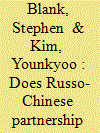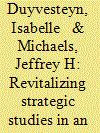|
|
|
Sort Order |
|
|
|
Items / Page
|
|
|
|
|
|
|
| Srl | Item |
| 1 |
ID:
148078


|
|
|
|
|
| Summary/Abstract |
This article outlines the objectives of the EU-sanctions against Russia, comparing the expectations of the politicians, media and the public with the views expressed in theoretical debates, as well as experiences gained from historical lessons. The essay seeks to answer the question: what could be realistically achieved as a result of the sanctions and what remains beyond their reach?
|
|
|
|
|
|
|
|
|
|
|
|
|
|
|
|
| 2 |
ID:
148077


|
|
|
|
|
| Summary/Abstract |
The Russo-Chinese relationship is one of the most important relationships in both Asian and international security. It is undergoing dynamic evolution as a result of the Russian war in Ukraine. This article stresses that the bilateral relationship is one where both Moscow and Beijing espouse the logic of the strategic triangle vis-a-vis the United States. But Washington renounces the effort to deal with Russia and its Asian relations as a strategic entity. Moreover, over the last 12-18 months, although Russia has sought an independent standing in Asia apart from China, it is increasingly unable to compete with China or assert that independence, due to its invasion of Ukraine, isolation from the West, sanctions, and failed economic policies. Thus, it is losing out to China and becoming more dependent on it. These trends are apparent in Russian policies towards Japan, the two Koreas, Southeast Asia, and Central Asia.
|
|
|
|
|
|
|
|
|
|
|
|
|
|
|
|
| 3 |
ID:
148071


|
|
|
|
|
| Summary/Abstract |
This article contends that during the Republican administrations of the 1920s, U.S. officials pursued no deliberate strategy of offshore balancing. On the contrary, Washington hoped to transcend the necessity for balance of power policies altogether through developing a new, demilitarized and economically interdependent world order. The strategy was certainly offshore, in the sense of avoiding alliance commitments, but it did not involve great power balancing. Instead, it combined a business orientation, deep aversion to the use of force, and a profound optimism in the inevitability of peaceful international progress.
|
|
|
|
|
|
|
|
|
|
|
|
|
|
|
|
| 4 |
ID:
148074


|
|
|
|
|
| Summary/Abstract |
The effort to raise host nation security forces was central to the U.S. strategy in both Iraq and Afghanistan. The U.S. poured massive resources into both countries. Unfortunately, U.S. planners failed to understand the cultural and political environments in which these forces would have to operate. Thus, the United States attempted to build ministries and forces based on U.S. models that simply were not appropriate for those nations. Although the training teams successfully recruited, trained, and deployed almost a million Afghans and Iraqis, Iraqi forces have collapsed and the Afghans are struggling to keep the insurgents at bay.
|
|
|
|
|
|
|
|
|
|
|
|
|
|
|
|
| 5 |
ID:
148072


|
|
|
|
|
| Summary/Abstract |
Amidst recent Western military campaigns that have defied strategic logic and produced few, if any, tangible gains, the utility of force in contemporary conflicts is being questioned increasingly, yet very few useful answers are emerging. Unfortunately, policymakers have too limited an understanding of military affairs, and the officials and experts tasked to inform them often have vested interests or lack imagination. Whereas strategic studies scholars were once highly sought after to “think the unthinkable” and provide fresh ideas for policymakers, the field has since fallen on hard times and shows no signs of recovery. To resuscitate the field there is an urgent need for a fundamental re-evaluation of long-standing strategic concepts in light of present realities.
|
|
|
|
|
|
|
|
|
|
|
|
|
|
|
|
| 6 |
ID:
148073


|
|
|
|
|
| Summary/Abstract |
According to the 2015 National Security Strategy, the United States continues to rely on Europe as its most likely, most capable military partner for dealing with the most vexing security challenges. However, the conventional wisdom in Washington holds that European allies are not terribly capable militarily or very willing to use force. So why would the United States rely on such lax partners? In fact, the evidence on European defense spending, capabilities, and willingness is decidedly mixed, with many positive trends among the negative ones. To build on the positive, the United States can bring to the table assets and resources necessary to facilitate the transatlantic partnership before it needs to be exercised.
|
|
|
|
|
|
|
|
|
|
|
|
|
|
|
|
| 7 |
ID:
148079


|
|
|
|
|
| Summary/Abstract |
American efforts against the ISIS foreign fighter threat largely have failed because they underestimate the malignance of ISIS recruits. This article proposes a modified strategy comprising three aspects: 1) a counter-narrative stressing ISIS's attacks on Sunni Muslims, questioning their religious credentials, and accurately describing conditions in ISIS-controlled territory; 2) a comprehensive effort to disrupt ISIS recruitment on social media; and 3) countering foreign fighter mobility through a comprehensive international effort to identify foreign fighters, suspending their passports, and revoking their citizenship. Unfortunately, even these efforts will only be a partial fix for the vastly larger problems of jihadism and radical Islam.
|
|
|
|
|
|
|
|
|
|
|
|
|
|
|
|
| 8 |
ID:
148076


|
|
|
|
|
| Summary/Abstract |
The violent conflicts in developing countries during the 1990s too often were blamed on rebel groups fighting for natural resource loot. Yet, the natural resources do not cause conflict, which is often rooted in deep-seated and historically contingent sets of grievances. For this reason, we should not expect regulations to end conflict or consolidate peace. Rather, we must look for opportunities for reconciliation, cooperation and confidence building, as well as greater inclusion of individuals and communities in decisions about natural resources.
|
|
|
|
|
|
|
|
|
|
|
|
|
|
|
|
| 9 |
ID:
148075


|
|
|
|
|
| Summary/Abstract |
Some observers are drawing parallels between governing the Catholic Church and governing the party-state in China. Analogy can be illuminating, but it also can obscure or mislead. This article contends that there are three quintessential similarities between the two polities. Both are permeated perennially by agency problems. Each is a self-claimed “virtuocracy.” And both hold aloft distributive justice, a mission that, if overlooked, would undermine the polities’ raisons d’être. This essay also contends that the two polities differ in three fundamental aspects. Seemingly functioning beyond a legal framework, the clerics and others who broadly implement the policies of the Catholic Church actually are as subject to the law as anybody in a liberal democracy, unlike the leaders of the party-state in China. Second, the party-state in China is more obsessed with blame avoidance than claiming credit, while the reverse is true for the Holy See. Finally, and paradoxically, the party-state in China is far less ideologically constrained than the Vatican. These comparisons and contrasts between the two polities help to shed light on the intrinsic nature of each regime.
|
|
|
|
|
|
|
|
|
|
|
|
|
|
|
|
|
|
|
|
|